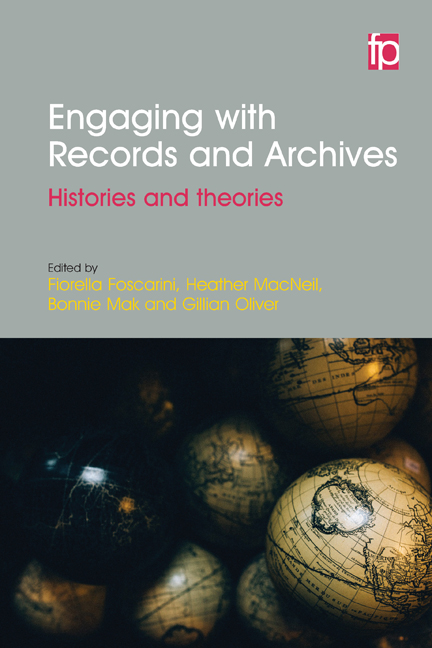Book contents
- Frontmatter
- Frontmatter
- Editors and contributors
- Editors’ introduction
- PART 1 RETHINKING HISTORIES AND THEORIES
- 1 Moving the margins to the middle: reconciling ‘the archive’ with the archives
- 2 Organisms, skeletons and the archivist as palaeontologist: metaphors of archival order and reconstruction in context
- 3 ‘Records in context’ in context: a brief history of data modelling for archival description
- 4 Mapping archival silence: technology and the historical record
- 5 Hidden voices in the archives: pioneering women archivists in early 20th-century England
- PART 2 ENGAGING RECORDS AND ARCHIVES
- Index
3 - ‘Records in context’ in context: a brief history of data modelling for archival description
from PART 1 - RETHINKING HISTORIES AND THEORIES
Published online by Cambridge University Press: 08 June 2018
- Frontmatter
- Frontmatter
- Editors and contributors
- Editors’ introduction
- PART 1 RETHINKING HISTORIES AND THEORIES
- 1 Moving the margins to the middle: reconciling ‘the archive’ with the archives
- 2 Organisms, skeletons and the archivist as palaeontologist: metaphors of archival order and reconstruction in context
- 3 ‘Records in context’ in context: a brief history of data modelling for archival description
- 4 Mapping archival silence: technology and the historical record
- 5 Hidden voices in the archives: pioneering women archivists in early 20th-century England
- PART 2 ENGAGING RECORDS AND ARCHIVES
- Index
Summary
IN THIS SHORT paper, I attempt to identify some historical factors that combine to explain current differences in certain of the data modelling practices of the archives, library and museum (ALM) communities. I am prompted to do this out of interest in the work of the International Council on Archives’ Experts Group on Archival Description (ICA-EGAD; see Gueguen et al., 2013; Pitti et al., 2014). This group is engaged in the design of a new model of data that is descriptive of archival holdings, with the intention that eventually it shall supersede older models that are deemed less useful in contemporary contexts. Reading between the lines of EGAD's ‘Interim Report’, some observers initially speculated that this new model may be more in line with those developed in the library and (in particular) the museum communities.
It occurred to me that a historical analysis might help us to weigh up the pros and cons of adopting the new model. It certainly seems prudent to ask in what ways such a development might be construed as a positive one whose benefits outweigh its costs; and my assumption is that a historical analysis could help us to answer that question. If we were to come to an understanding of the historical conditions for the distinctive direction taken by developers of archival standards since 1987 (so the argument goes), and compare them with advances made in libraries and museums, then that would help us to account for differences in the data models that have been produced in each domain, and perhaps also help us to understand the need for a new archival model.
There is an ethical subtext to all of this, which arises from asking the question whether, ceteris paribus, data models should be (a) more like one another or (b) less like one another than they currently are. My characterization of this as an ethical question derives from a conviction that one's answer will depend on how much one values uniformity above or below diversity. I believe that this valuation will be a complicating factor in determining one's feelings about different data models.
Information
- Type
- Chapter
- Information
- Engaging with Records and ArchivesHistories and Theories, pp. 41 - 62Publisher: FacetPrint publication year: 2016
Accessibility standard: Unknown
Why this information is here
This section outlines the accessibility features of this content - including support for screen readers, full keyboard navigation and high-contrast display options. This may not be relevant for you.Accessibility Information
- 1
- Cited by
